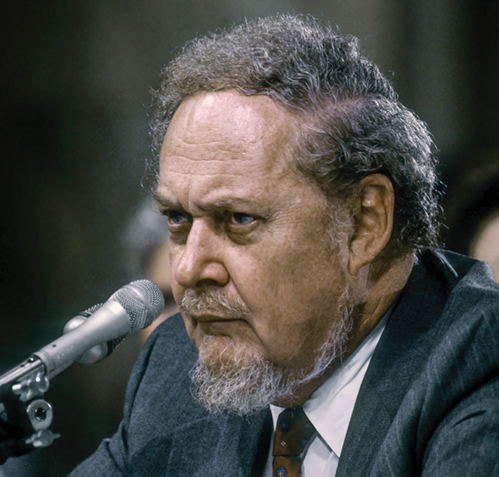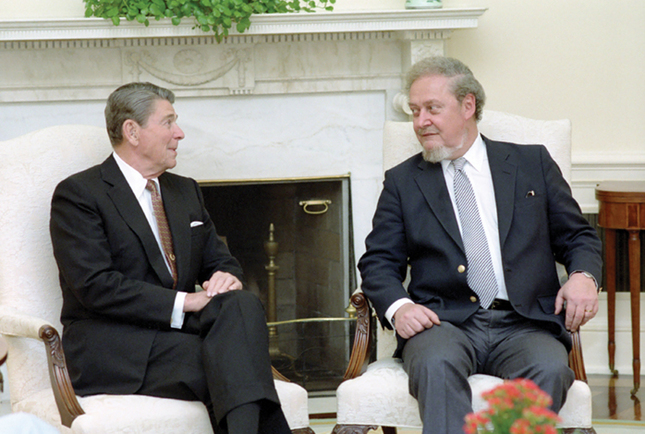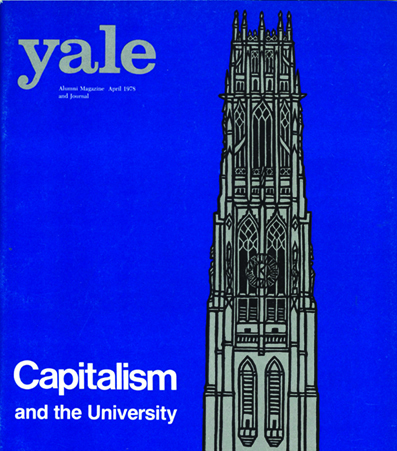
Mark Reinstein/Getty Images
Robert Bork testifies before the Senate Judiciary Committee in 1987 during his Supreme Court confirmation hearings. (He was rejected.) Bork made his name as a Yale Law School professor who helped found the modern conservative movement.
View full image

Mark Reinstein/Getty Images
Robert Bork testifies before the Senate Judiciary Committee in 1987 during his Supreme Court confirmation hearings. (He was rejected.) Bork made his name as a Yale Law School professor who helped found the modern conservative movement.
View full image

National Archives
Bork with President Ronald Reagan in the Oval Office on July 1, 1987, the day Reagan nominated him to the Supreme Court.
View full image

National Archives
Bork with President Ronald Reagan in the Oval Office on July 1, 1987, the day Reagan nominated him to the Supreme Court.
View full image

The April 1978 issue of the Yale Alumni Magazine, in which Bork urged that the US take up his push for laissez-faire economics.
View full image

The April 1978 issue of the Yale Alumni Magazine, in which Bork urged that the US take up his push for laissez-faire economics.
View full image
By the 1960s, Bob Bork had grown bored with his job at a law firm. He had certainly been successful there: he’d risen to become a partner in the Chicago office of Kirkland & Ellis, where his specialty was defending companies in antitrust cases. But Bork—then in his mid-30s, with a tangle of curly red hair—missed the intellectual stimulation he had enjoyed when he was a student at the University of Chicago.
Before he enrolled in UChicago, in the late 1940s, he’d been a high school student who was sympathetic to socialism. His mother, Elizabeth, a schoolteacher in Pittsburgh, had encouraged him to attend Chicago because she worried that he’d been drifting toward far-left politics, and she had heard Chicago was a university that pushed its students to grapple with a range of ideas. Sure enough, Bork (1927–2012) left his leftist ideas behind after arriving in Chicago. First he became a New Deal Democrat, as his parents were, and then he continued moving to the political right after enrolling at the University of Chicago Law School.
There he studied with a group of professors who rejected the post–World War II consensus that favored a large government role in economic activity and instead argued for low taxation, light regulation, and laissez-faire economics. His time at Chicago, Bork later said, was “a little bit like a conversion experience.” He also appreciated the professors’ tough-love approach to mentorship. They suggested ideas for academic papers, and they instilled confidence in Bork while also offering blunt criticism. “It is preposterous that this is not better written,” Edward Levi, the law school's dean (and a future attorney general) wrote to Bork about an early draft of a paper. “If necessary, you ought to take two hours on every paragraph and perhaps a day or so on some of them.”
Life at a law firm, by comparison, was tedious. In the early 1960s, hoping for something more exciting, Bork contacted Levi—still the law dean at Chicago—and asked for aid in finding a faculty job somewhere. Levi was happy to help. He wrote to other deans around the country, praising Bork’s intellect and encouraging them to hire him. Yale Law School soon offered Bork a position. He accepted, even though it cut his income by about two-thirds. He joked that he was returning to “the leisure of the theory class.”
At Yale, Bork would become a leading laissez-faire scholar, developing a new approach to antitrust policy. He would become famous, known by his formal name, Robert Bork. In 1973, he was the Justice Department official who carried out President Richard Nixon’s order to fire the Watergate special prosecutor during the so-called Saturday Night Massacre. In 1987, President Ronald Reagan nominated Bork to the Supreme Court, only for the Senate to reject him as too conservative. Today, he is remembered mostly for that defeated nomination.
But Bork’s historical significance is broader, and it revolves around the 15 years he spent as a Yale professor, from 1962 to 1981 (with a break to work in the Justice Department). During that time, Bork demonstrated how to build an intellectual movement that could change conventional wisdom and, ultimately, government policy. I became fascinated with Bork while writing a recent book on the history of the American economy, and I believe that his grand project still offers lessons today—for people of all political beliefs.
When Bork joined the Yale faculty in 1962, he jumped into campus life. He ate at Mory’s and became a fellow of Branford College. He was known as an engaging teacher who encouraged debate. He also stood out as somebody whose political views were well outside the mainstream, not only at Yale but in the nation. “When he came on, he immediately made an impact because he was so bright and ornery in terms of being willing to argue with everybody about everything,” Guido Calabresi ’53, ’58LLB, then a fellow professor, later said.
By the 1960s, the United States had been thriving for almost two decades. Economic growth was rapid, the middle class was growing, and income inequality was falling. Bork and his fellow laissez-faire advocates seemed out of touch when they advocated a different economic approach.
The same year that Bork joined the Yale faculty, Milton Friedman—an economics professor at the University of Chicago—published the book Capitalism and Freedom, which made the case for laissez-faire economics. (Rose Friedman, Milton’s wife, had written much of the prose, editing Milton’s academic language for a general audience.) Milton, frustrated by the lack of attention the book received, kept a list of publications that did not even review it, including Time and the New York Times. Still, Bork and Friedman believed they were playing the long game. They pointed out flaws in the logic of the postwar economic consensus and hoped to win converts slowly. Eventually, Bork and Friedman expected that the economy would fall into a new crisis, and public opinion might shift.
To persuade people, Bork decided that he had to reach audiences larger than those reading academic journals. He adopted as a personal motto a line that he had heard from Alexander Bickel, a Yale Law School colleague: “Wreak yourself upon the world.” With that in mind, Bork wrote a book on antitrust policy, intended for a general audience. He developed relationships with conservative journalists like George Will and William Safire, and he wrote op-eds and magazine articles.
In April 1978, he published a Yale Alumni Magazine article entitled “Will Capitalism Survive?” that summarized his worldview. Bork settled on a word—“culture”—to describe what he was trying to change. “Capitalism is the name not merely of an economic system but of a complex of institutions and attitudes, a culture,” he wrote in the first sentence. By this point, the United States was indeed falling into an economic crisis. Government spending—on both the Vietnam War and domestic programs—had caused inflation to rise in the 1960s, and the 1973 Arab oil embargo caused inflation to soar. Many Americans became frustrated and willing to consider a new economic approach.
Reagan’s victory in the 1980 presidential election led to the enactment of many of Bork’s and Friedman’s ideas. Reagan appointed judges who embraced Bork’s argument that corporations should be allowed to buy rivals because big companies were often efficient. One of these judges was Bork himself, who became a federal appellate judge in 1981. Reagan also signed a large tax cut, loosened business regulations, and took an antagonistic approach to labor unions. In some cases, these changes required the passage of federal laws. In many other cases, they required only the cultural change that Bork had advocated: federal judges and regulators could enforce the law consistent with laissez-faire principles.
In 1982, Bork returned to Yale Law School to speak at the inaugural conference of an organization—the Federalist Society—devoted to spreading this culture through the judicial branch. The group’s goal, Bork urged, should be to change the “politics and values” of the people who shaped economic policy. The Federalist Society became a vehicle for these ideas, in this magazine and elsewhere.
By one standard, Bork’s project was fantastically successful. His views on antitrust policy reshaped policy, allowing companies to grow vastly larger. Bork also helped forge a new legal theory which argued that the Supreme Court should usually limit itself to narrow interpretations of the Constitution, consistent with the founders’ original intent. Later, the popular term for this idea became “originalism,” and it has guided Republican judicial philosophy, constraining the government’s power. Although Bork himself never sat on the Supreme Court, its rulings today often hew to his ideas.
In other ways, however, the project Bork and his fellow conservatives advanced has been a failure. They promised that a laissez-faire economy would benefit all Americans. Instead, only a narrow set of economic indicators, such as stock prices, has flourished. Most Americans have not. Income growth since the 1980s has been weak for the poor and middle class, and inequality has soared. Other indicators have also lagged, and many Americans have felt frustrated.
Perhaps most starkly: in 1980, the United States had a typical life expectancy for a high-income country, yet for most of the twenty-first century, this nation has had the lowest life expectancy of all other high-income countries. The post-1980 American economy has failed to deliver on most of its promises.
In response, a new generation of economic thinkers, on both the political left and right, have called for change. Some are pushing for a reinvigoration of antitrust policy. Others favor tax increases, government investments, trade restrictions, or laws to protect labor unions. These thinkers would disagree with Bork’s grand project on nearly all questions of substance. Nonetheless, they could learn a lot from his success at changing how people thought about the American economy, and ultimately changing the laws that govern it.
 loading
loading